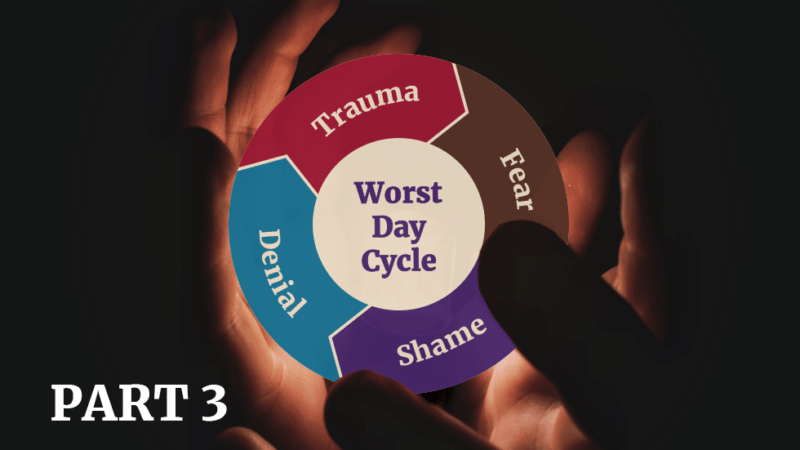In part 3 of how to heal The Worst Day Cycle, I will share how the brain and body create the emotional, and chemical addiction to fear, which is stage 2 of the cycle. If you missed parts one and two, I provide links at the end of this article.
How the brain works
It takes tremendous energy for our brain to do anything. For example, 25% of the calories we ingest go straight to powering the brain. So, our brains have come up with an incredibly ingenious solution; it chooses to repeat what it has already experienced in life. Scientists estimate that 95%-99% of our lives; our subconscious repeats what we learned in the first seven years of life. Our brain doesn’t care (or know) whether something is good or bad for us? Its primary concern is energy conservation and survival.
So, what did we learn in childhood? In part 2 of this series on The Worst Day Cycle, I spoke about how everyone experiences childhood trauma because we are human. The only way we could not experience trauma is if a perfect ‘God’ raised us.
This might be new information for you, and you may feel like you want to stop reading? If so, you are experiencing fear. Whenever we see, smell, taste, touch, hear or learn new things, our brain goes into fight, flight, or freeze mode – it is an automatic survival response. New information threatens what we already know and could potentially cause harm or danger. This physiological response of fear may be triggered without observable effects on behavior and without subjective awareness, i.e., you may not even know you feel fear right now. Still, if any type of information is new, your body will produce the chemically addictive fear response.
Why does this matter? What happened the first time you remember making a mistake? Can you feel or hear it? Was Mom or Dad looking at you a certain way, or did you simply pick up on a feeling in the room? Or maybe you were physically punished? Whatever it was, the message received as a child was that ‘You’re bad!’. This is a learned reaction to making mistakes and only comes from our parenting – it’s not an inherent characteristic of our species. It requires a great deal of awareness and intention not to leave wounds and trauma in our children, and, once again, it’s not to blame parents but to enable them to take responsibility for their humanness and perfect imperfections.
To reduce a child’s experience of trauma, a parent needs to know how to communicate the difference between an objectionable behavior and the child’s inherent worth.
So, as an adult, when you experience new things or make mistakes, you are subconsciously and immediately taken back to those experiences when your parents sent the message that you were bad. Because this is what your brain knows, it reaches for this experience to conserve energy. As adults, self-destructive behaviors like unhealthy relationships, poor finances, weight issues, job insecurity, etc., actually have their origins in your childhood. Your brain is repeatedly seeking to repeat what it knows.
We’re all afraid of success.
Let me share something with you, and this will shake up what you’ve always thought. Not a single person on this planet is afraid to fail. Since the brain seeks to repeat what it knows at all costs, everyone is afraid to succeed. The proof? Have you ever found yourself procrastinating? When you think about making a change, no matter how small, whether it’s going from being in bed to getting up, to sending an email, or visiting a friend, what comes up? Thoughts like ‘Ugh, I don’t feel like it,’ ‘I’ll start the diet tomorrow, ‘I’ll do it later. Do you see, at that moment, you have chosen failure?
The feeling of doing anything new creates a fear response – because we learn in childhood that if we do something different (i.e., something that could potentially upset mom or dad), we could be unloved, rejected, or abandoned. Therefore, since we have repeatedly accepted failure, we are not afraid of it. What we are fearful of is a new action that would create success. So we repeat failure.
Because of the subconscious programming we have from childhood, we get stuck in the chemical cocktail of self-victimizing negative feelings. That is why our greatest fear is to succeed.
There is also a second way that our brain sabotages us. When we experience fear, it stops blood from flowing to the front part of our brain. The front part is the cognitive part, where thinking and learning happen. Therefore, if we can’t regulate ourselves emotionally, we can’t access intellect and decision-making.
When we lack emotional skills, we often don’t know what we want and struggle to make decisions, so it is crucial to start moving more into our feelings to heal our childhood issues. This is the way you regain your authentic self. We must become experts in how the emotional pain from the past influences us in the here and now.
Bessel van der Kolk points out that neuroscience shows that we can only change the way we feel by becoming aware of our inner experiences and learning to befriend what is going on inside of ourselves. This means that, no matter how old you are or how perfect you believe your childhood was, everything you are going through now originated in your childhood experiences. Until you can befriend those emotions and experiences, you won’t be able to make a change.
Do any of these sound familiar in your life now:
- You are a great listener, but you don’t know how to make conversation because you fear voicing your own opinions and beliefs?
- Go along instead of fighting and protecting yourself?
- Care for others but don’t ask for help?
- You get others to decide for you instead of sharing your desires and preferences, or do you not even have any?
- Don’t recognize excludion, mistreatment, or abandonment?
- You can’t feel others’ anger or fear or see you are in danger?
- Misread social cues? Your mirroring component is dysfunctional?
Van der Kolk also says, ‘All too often, your decisions are based on the fear of getting in trouble or getting abandoned, rather than on the principles of having meaningful and equitable interactions with the world.’ All of the above are perfect imperfections that don’t make you bad. They are simply learned subconscious behaviors that have led to inauthenticity as adults because we are so afraid of rocking the boat and being rejected.
As Alice Millar says, ‘In every adult lies dormant that small child’s fear of punishment at the hands of the parents if he or she should dare to rebel against their behavior. But it will lie dormant only as long as that fear remains unconscious. Once consciously experienced, it will dissolve in the course of time.’
More about the body, fear, and stress
As Gabor Mate says, ‘For those habituated to high levels of internal stress since early childhood, it is the absence of stress that creates unease, evoking boredom and a sense of meaninglessness. People may become addicted to their own stress hormones, adrenaline, and cortisol, Hans Selye observed. To such persons, stress feels desirable, while the absence of it feels like something to be avoided.’
These are your workaholics, the people who cannot keep still – or can’t date “boring” people. They can’t bring themselves to stop and feel. But unfortunately, this avoidance doesn’t work. You cannot run from your pain and trauma forever and expect to be authentically happy or authentically you.
Unfortunately, our medical disease model is only concerned with prescribing pills to deal with these issues. That is a significant problem for us all. As Van der Kolk says, ‘After conducting numerous studies of medications, I have come to realize that psychiatric medications have a serious downside, as they may deflect attention from dealing with the underlying issues. The brain-disease model takes control over people’s fate out of their own hands and puts doctors and insurance companies in charge of fixing their problems.’ This isn’t to say we should get rid of medication, but medication only medicates symptoms; it doesn’t treat the cause of conditions.
With so much apparent evidence, our future relatives will wonder why the medical establishment didn’t help people more emotionally? I am confident that we will rethink how we treat illness and disease in the next few hundred years.
In conclusion
1- We get stuck in fear.
2- We fear success, not failure.
3- We become emotionally addicted to repeating failure because it requires less brain effort than making a change.
We are now ready to discuss the next stage of The Worst Day Cycle. In the following article, I will show you how shame becomes a self-victimizing power dynamic to stay the child.
Stick around to learn how mastering shame and denial are the two most essential steps to reclaiming your authenticity, conquering The Worst Day Cycle, and developing Emotional Authenticity.
How To Heal The Worst Say Cycle – Part 1
How To Heal The Worst Say Cycle – Part 2
Are you looking for more solutions? Pick the one that suits your needs best!
1- My Book, Your Journey To Success
2- My Complete Emotional Authenticity Method
3- My Perfectly Imperfect Private Group
4- My Private Coaching
Learn more here:




